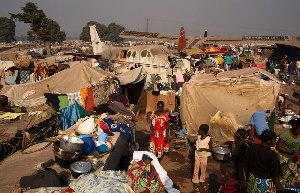Blame apportionment and allocation are a perennial preserve of the weak!
In what surely feels like a lull of backwardness and a slow pace of development, there must arise a soul, who with a loud blast of a trumpet will communicate the sense of urgency to bestir us from our accepted fate of torpor and stupor.
Indeed, the culture of blame will never fix anything on this continent. We are poor because we have chosen to be so. And such truths hurt our indolent instincts.
When are we going to stop prattling on about the inequalities and inefficiencies that have resulted in our current economic state? We are poor in economic variables, and that is true; but even more, we are very poor in thoughts, and that is a stinging and scorching indictment on us as a continent.
This week, to facilitate and augment my ‘can-do’ philosophy, I amused and disported myself with video clips focusing on Dubai and the breathtaking pace of their development. While watching some of those clips, I had to drive not just a suspicion of moisture from my incredulous eyes, but real tears.
In fact, I discovered almost a boulder in my throat as I saw the immense transformation of a desert land. In one clip, a man recounted that if it is not grand and massive enough, it is not good enough for Dubai! What?
Time and time again, through the agency of books, many a man has been in a position to escape the provincial perimeter of narrow thought and discovered the existence of abounding possibilities. And yet, there are many that continue to accept the supposed cards that nature has dealt to them.
In that sense, they do nothing and unsurprisingly: achieve nothing!
In the last few years, I have sidestepped the watered-down version of Christianity that has been handed to us on this continent, and gone back to the Bible to see and know what God has in store for those who choose to consult the Scriptures as an unfailing lodestar.
In truth—and perhaps as an indictment on the current arrangement and brand of Christianity we practise on our shores—it is unsurprising that our countries continue to totter and potter and saunter in the fierce race of development, when one would have expected us to travel with alacrity and celerity; indeed, to move with legerity and agility.
We have chosen poverty when we have everything to become even more advanced than a city like Dubai—an emirate.
In a separate article, I shall outline how the overriding selfishness of a few continues to limit the blessings of the many.
In any case though, right in this article, my pellucid goal is to beat my talking drums so loud, and to declare that as long as we continue to look to the current variables and to point fingers at others, we will always continue in our perennial poverty.
Perhaps, the sound coming from my drums will not get into the ears of the leaders of the continent. True, we elected them, and they most likely took with them wax to the presidential palaces. Is it a trifle astonishing then that they are deaf to our screeching calls for change? We should equally share and consume our morsel of blame.
Before anybody attempts to school me on economics and give me a lecture that will be nothing but a redundant dissipation of strength and a wanton waste of effort; they should spare me their convoluted screed. I am not ignorant by any shred of the imagination.
Indeed, it is not the business books, Bloomberg, BBC or another respected periodical or journal that actuated me to start writing—it is the Bible. And in all candour, I do not make apologies for that. And if there are others who read different books, and have been moved by those books to call for practical change on the continent of Africa, let them share their vital knowledge with us—democracy has room for a tapestry of varying opinions and sources.
‘A mirage’
It is not by accepting the status quo that we can expect to see change; it is by a concerted effort backed by a titanic will of purpose to reject inequity and inequality, and to own up to our own visible failings, and to seek to make the necessary amendments, and take the right actions that we can expect to see real change.
At heart, I am an optimist, perhaps a practical optimist, if there is anything like that.
I believe in the hidden potential and wonder that could be revealed on this continent, but in all truth, until we reject the status quo, we can never kiss the elusive halo of true advancements and development. It will be a mirage.
I could always bend over and bash my keypad the very same way I will bash the West for unfair trade policies and practises. Yes, I could argue for an immediate change in the rules on debt, beg for more aid, or scream for a reformation in unfavourable trade agreements.
This is a bore. Haven’t we castigated ‘them’ enough? Have they owned up to our situation? Rather, see how many of our people are dying in the oily waters of the Mediterranean trying their hardest to flee what is a failing—not yet a failed—continent. Is that the sort of aspirations that young people can have, trying to escape to Europe? It is our fault, and we must own up to it.
There are people who although born into poverty apply their innate forces to meaningful activities, and by dint of hard work and a willingness to prime the pump of life, are able to escape the withering scorn of bitter poverty.
Nevertheless, for others, they are like what Job 21:25 observes: “Another person dies in bitter poverty, never having tasted the good life” (New Living Translation).
Today, I am sticking the knife where it hurts most. I am saying in a loud and clear manner that our poverty is our problem. It is staring at us, teasing us to do something about it.
There are times when I review what could very well be the boundless inanity and unfathomable nescience on the continent; it is almost sickening to say the least. If our ancestors got us into the current state in which we find ourselves, then without a scintilla of a doubt, our willingness to accept the current state of affairs is surely and equally complicit.
‘Bring about change’
Writing and pouring out one’s deepest passions for me surely has to be a way of letting out pent-up emotions and thoughts in the hope that another person not thinking similar thoughts and exhibiting false contentment—a popular trait on the continent—will catch a fire that will light up his or her soul. But writing alone will not change a continent: right action will.
And this truth, I know very well. At the right time, such actions being undertaken away from the eyes of the public will come to continental attention.
For you the reader, perhaps you agree that our poverty is our problem. In that case, will you also from today commence doing something to bring about change? Or you surmise, it is only our leaders that hold the keys to change? Think again.
If today, we can harness the best talents on the continent and decide we are tired of the poverty on our shores—hunger and malnutrition, to name a few—then we could very well start witnessing, not just the glimmer of change, but see real change in every corner of our continent.
I shall return with my amplified talking drums!
Opinions of Sunday, 24 April 2016
Columnist: Angelina K. Morrison



















